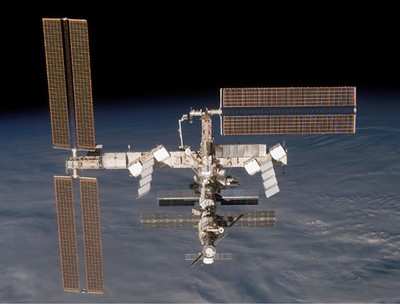Sat, Mar 17, 2007
Station Hits Lowest Average Altitude In History Of Project
Say... is that bright light in the sky getting closer? If you're
looking at the International Space Station... why yes, it is. But
NASA says there's no reason panic.

MSNBC reports NASA's tracking data shows the nine-year-old
station's orbital path has slipped to just 207 miles above the
Earth, its lowest average altitude ever. Rocket burns meant to send
the station into a higher orbit -- such as the series carried out
this week, using the engine of a docked Russian Progress module --
have resulted in only slight improvements.
The station has been falling since its first components were
placed in low-earth-orbit back in 1998, due to constant atmospheric
drag. But the decline took a noticeable dip in 2003, when NASA
grounded its space shuttle fleet following the loss of Columbia.
Visiting shuttles had been able to give sizable reboosts to the
station; since 2003, however, such firings have been done by the
much smaller Russian capsules.
NASA maintains the station's orbit is stable, and the Russian
firings are enough to keep the station from slipping ever closer to
Earth. Once larger components of the station are delivered and
installed by the space shuttle next year, the orbiters will resume
the primary responsibility for correcting the station's orbit.
"Our altitude is driven by shuttle rendezvous altitude limits,"
said Mission Control expert Ainsley Collins, who along with her
Russian counterpart helps coordinate reboost firings, and other
maneuvers.
"The lowest the station orbit has ever been was on May 23,
2000," Collins recalled, when the station reached its lowest point
after dropping 43 miles from a high orbit of 250 miles. A shuttle
then pushed the station higher... and over the next two years, the
station remained relatively stable at around 246 miles. Then the
slide began.
Collins added the boosts are barely noticeable to the station's
crew. The force produced by Thursday's 12.5-minute firing of the
Progress module's manuevering rockets only resulted in about .5 g's
of pull.
More News
Aero Linx: Space Medicine Association (SMA) The Space Medicine Association of the Aerospace Medical Association is organized exclusively for charitable, educational, and scientific>[...]
Jamming Denotes emissions that do not mimic Global Navigation Satellite System (GNSS) signals (e.g., GPS and WAAS), but rather interfere with the civil receiver's ability to acquir>[...]
Aero Linx: Warbirds of America The EAA Warbirds of America, a division of the Experimental Aircraft Association in Oshkosh, Wisconsin, is a family of owners, pilots and enthusiasts>[...]
"From New York to Paris, this life-size replica of the Webb Telescope inspired communities around the world and, in doing so, invited friends and families to explore the cosmos tog>[...]
Hold-In-Lieu Of Procedure Turn A hold-in-lieu of procedure turn shall be established over a final or intermediate fix when an approach can be made from a properly aligned holding p>[...]
 ANN's Daily Aero-Linx (04.17.24)
ANN's Daily Aero-Linx (04.17.24) ANN's Daily Aero-Term (04.17.24): Jamming
ANN's Daily Aero-Term (04.17.24): Jamming ANN's Daily Aero-Linx (04.18.24)
ANN's Daily Aero-Linx (04.18.24) Aero-News: Quote of the Day (04.18.24)
Aero-News: Quote of the Day (04.18.24) ANN's Daily Aero-Term (04.18.24): Hold-In-Lieu Of Procedure Turn
ANN's Daily Aero-Term (04.18.24): Hold-In-Lieu Of Procedure Turn



